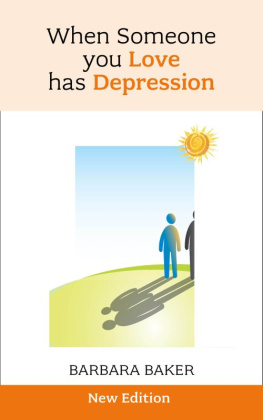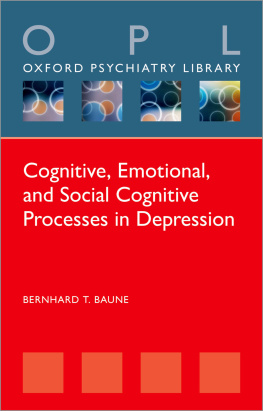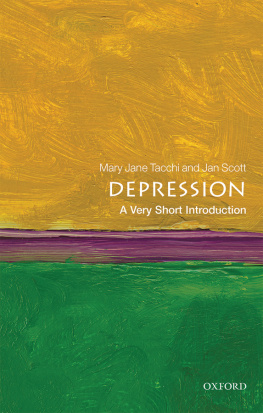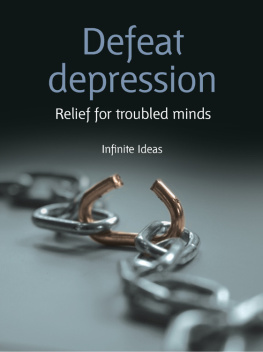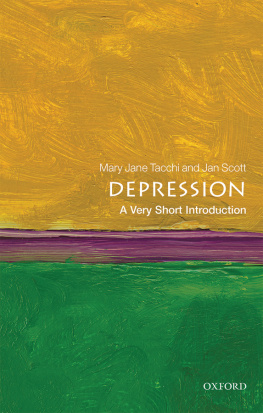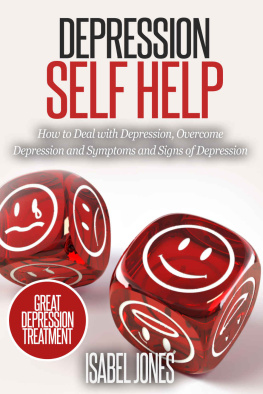
DEPRESSION AND THE EROSION OF
THE SELF IN LATE MODERNITY
DEPRESSION AND THE
EROSION OF THE SELF IN
LATE MODERNITY
The Lesson of Icarus
Barbara Dowds

First published 2018
by Routledge
2 Park Square, Milton Park, Abingdon, Oxon OX14 4RN
and by Routledge
711 Third Avenue, New York, NY 10017
Routledge is an imprint of the Taylor & Francis Group, an informa business
2018 Barbara Dowds
The right of Barbara Dowds to be identified as author of this work has been asserted by her in accordance with sections 77 and 78 of the Copyright, Designs and Patents Act 1988.
All rights reserved. No part of this book may be reprinted or reproduced or utilised in any form or by any electronic, mechanical, or other means, now known or hereafter invented, including photocopying and recording, or in any information storage or retrieval system, without permission in writing from the publishers.
Trademark notice: Product or corporate names may be trademarks or registered trademarks, and are used only for identification and explanation without intent to infringe.
British Library Cataloguing-in-Publication Data
A catalogue record for this book is available from the British Library
Library of Congress Cataloging-in-Publication Data
A catalog record has been requested for this book
ISBN: 978-1-78220-590-6 (pbk)
Typeset in Palatino
by V Publishing Solutions Pvt Ltd., Chennai, India
To the memoir writers and all who struggle with depression
It would be a poor result of all our anguish and our wrestling, if we won nothing but our old selves at the end of itif we could return to the same blind loves, the same self-confident blame, the same feeble sense of that Unknown towards which we have sent forth irrepressible cries in our loneliness.
George Eliot, Adam Bede
CONTENTS
Special thanks to Ted Dinan, Trish Morgan, and Paschal Preston for casting expert eyes over sections of the manuscript that are on the fringes of my own territory. In particular, Paschal and Trishs generosity and enthusiasm affirmed my confidence and gave me the energy to keep going with the long haul. I also want to thank former science colleagues Ann Burnell, Martin Downes, Christine Griffin, and Thecla Ryan for reading one of the hapters. I am grateful to my clients for all they continue to teach me, and to my friends and therapy colleagues Ger Byrne, Pauline Macey, Josephine Murphy, and Marjorie Travers for loving support. Also warm appreciation to Sean Rothery for his fellowship and coffees as we shared the progress of our respective manuscripts.
Most of all, as usual, I owe an enormous debt to Peter Labanyi: for particular help with the contents of , for reading the entire manuscript multiple times, for access to the library of his mind, for his inspired discussions, suggestions, and corrections, and above all, for his Winnicottian mothering and mood regulation.
Finally I want to thank Rod Tweedy at Karnac for believing in this project, and for his continuing encouragement and support. And thanks also to Constance Govindin, Kate Pearce and the rest of the team at Karnac for all their help and assistance.
Barbara Dowds, B.A. Ph.D. MIAHIP MIACP SIACP SIAHIP, was educated at Trinity College Dublin (TCD) and had a previous career in science as a researcher at the University of California and TCD, and later as a senior lecturer in molecular genetics at Maynooth University. She completed her therapy training in 2002, and then began to work as a humanistic and integrative psychotherapist. Barbara taught on various psychotherapy trainings between 2003 and 2014, and was on the editorial board of Eisteach (the journal of the Irish Association for Counselling and Psychotherapy) for seven years. She is the author of numerous articles and of Beyond the Frustrated Self (Karnac, 2014). Barbara is currently in private practice as therapist and supervisor and presents postgraduate training workshops. For more information, see www.barbaradowds.net
I was motivated to research and write this book because so much I read or hear about depression seems wrong, trivial, unhelpful, or unethical. It is wrong that something that is escalating so fast is put down to genetics or an imbalance of brain chemicals. It is trivial to focus therapy on symptoms, such as negative thinking, rather than the fundamental causes. It is unhelpful to put so much research funding into neuroscience, where the outcome is a detailed understanding of physiological mechanisms without any understanding of what it means to be a human being living in a particular society and time. It is unethical to condemn so many to drug dependence and the belief that they are defective, that the problem is theirs individually, rather than ours collectively. My aim is to explore the origins of depression and why the rate is increasing so rapidly (by twenty per cent per year according to Healthlinewww.healthline.com). I began my inquiry by examining personal accounts of depressive breakdown for clues about possible childhood influences and adult triggers. I then moved on to search for socio-cultural changes that might make sense of what is an epidemic of depression, given that as many as one quarter of people in the developed world have a lifetime risk of suffering from it.
The lack of any biological marker or indeed of any simple cause of depression tells us that it is not a disease. Our genetic makeup changes slowly over thousands of years, so the current increase in depression cannot be ascribed to faulty genes. While the statistical rise may partly be due to greater reporting of the condition now that there are more effective treatments available, it must also be connected to changes in the way we are living. I have written this book to get people to wake up: living the way we increasingly are in the twenty-first century is endangering our psychic health. We are living in the best of times and the worst of times. Health, longevity, material well-being, and freedom of mobility and action are all unprecedented in the developed world. But our freedom is restricted to a limited range of things, many of which dont ultimately matter; and it is restricted to certain people, the poor or socially disenfranchised being excluded. Even for the privileged, there is a price to pay for our affluence and, like the obese on junk food diets who have vitamin deficiencies, we seem to be starving in the midst of plenty.
Depression may be experienced as intense sadness, or as numbness or emptiness, and it is usually accompanied by anxiety. It is a somewhat vague term that can refer to an ongoing minor experience of low mood or to suicidal misery. Deep depression manifests as a mood disturbance that equals or exceeds the diagnostic threshold for major depression. This is characterised by having five or more of the nine symptoms listed by DSM-5: depressed mood; loss of interest or pleasure; sleep disturbance; guilt; low energy; psychomotor changes; inability to concentrate; change in weight or appetite; self-harm or thoughts of death. Nevertheless, depression is a term that is applied to low mood that lasts from minutes to years, to the condition of a morose temperament or to a suicidal breakdown.
Subjectively there are vast differences in the depth and length of depressive episodes, but it appears that while the experience may vary enormously, the roots of shallow and deep depression are the same. There are common risk factors, and longitudinal studies show that low-grade depression is a precursor of deep depression (Rottenberg, 2014). Likewise, after recovery from the worst of deep depression, patients typically continue to experience periods of shallow depression. Patients with a clinical diagnosis of minor depression have the same kinds of symptoms as patients with major depression, but fewer of them; and the condition is persistent, with most people still experiencing some symptoms a year later. Alarmingly, the chances of developing major depression are five times greater if you already have minor depression (ibid.). For these reasons, this book does not distinguish between different degrees of depression.
Next page

